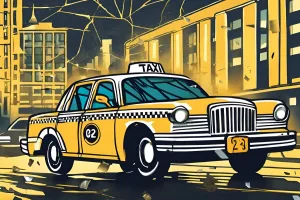The R408 million given to South Africa’s taxi industry has sparked a heated debate. Many people, including the group Build One South Africa, are worried about how the government is spending money, especially during tough economic times. Critics point out that while the taxi industry is important for transport, it hasn’t contributed much to taxes. They demand clear answers on how this money will be used and who will benefit, emphasizing the need for responsible and transparent governance. As this discussion unfolds, it highlights the ongoing struggles for fairness and accountability in South Africa.
The Cape Town taxi industry is facing a disturbing outbreak of violence, with twelve people killed in January and February. The violence is believed to be caused by internal disputes over lucrative routes, rather than between rival associations. The industry leaders are working with the police to intervene and stabilize the situation, and heavy security measures have been implemented to keep taxi drivers and ranks safe. However, the fear and frustration of the taxi drivers are palpable, and the path forward remains uncertain.
The Western Cape High Court has resolved a dispute between the City of Cape Town, the Western Cape Government, and the South African National Taxi Council (SANTACO) surrounding the impounding of minibus taxis. The court’s decision has clarified the grounds for impounding taxis, which had been a contentious issue.
Western Cape High Court Dismisses Santaco’s Application against City of Cape Town and WCG
The Western Cape High Court recently delivered a ruling that dismissed the South African National Taxi Council’s (Santaco) court application against the City of Cape Town and the Western Cape Government (WCG). As a result, the court granted the City’s request to make the terms of the agreement that ended the taxi strike an order of the court.
The South African National Taxi Council (Santaco) urges peaceful negotiations among all parties involved in the taxi industry and condemns any acts of public violence. This stance comes amidst a tense environment and debates over the release of impounded vehicles.
The Western Cape taxi industry had a challenging period due to an eightday stayaway that led to widespread damage to property, the local economy, and the region’s reputation. During a joint press conference, Premier Alan Winde, the City of Cape Town (CoCT), the Western Cape Government (WCG), and Santaco discussed the financial and reputational losses incurred by the industry, estimated by Santaco’s first deputy chairperson, Nceba Enge, at R50 million per day.
The ongoing taxi strike in the Western Cape has brought the public transport system to a standstill, with devastating consequences. This strike has lasted over a week now, and as minibus taxis are responsible for transporting around 75% of public transport users in the area, or about a million passengers per day, the impact has been significant. The Western Cape Department of Mobility has stated that these taxis serve areas not usually covered by other public transport services.
EFF Condemns Cape Town’s Conflict with Taxi Industry The Economic Freedom Fighters (EFF) Western Cape has expressed its disapproval of the ongoing conflict between the taxi industry and the City of Cape Town. The party has condemned the victimization of the taxi industry and the intentional delay of issuing taxi operating permits by the city, resulting in a prolonged strike.
Following a recent conflict between taxi drivers and law enforcement officials in Cape Town’s Central Business District (CBD), the South African National Taxi Council (SANTACO) has announced that they are recalling all taxis in the Western Cape province, ceasing operations indefinitely.









